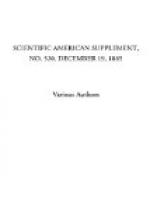* * * * *
A GAS-ENGINE WATER-SUPPLY ALARM.
[Illustration]
A very useful contrivance for the purpose of reporting automatically the failure of the water supply to a gas-engine has been arranged by Professor Ph. Carl, of Munich. What led to the adoption of the device was that, during last winter, the water supply in the neighborhood of the Professor’s laboratory was several times cut off without previous notice; the result being the failure of the water needed for cooling the cylinder of his Otto gas-engine. On inquiring into the matter, he discovered that the same thing frequently occurred in other places where gas-engines were in use; and this caused him to design a contrivance to put an alarm-bell into action at the instant when the water ceased to flow, and so enable any overheating of the engine, and injuries thereby resulting, to be prevented in time. The arrangement (represented half size in the accompanying engraving) is screwed down directly to the water outflow pipe, R. Before the aperture of the pipe is a lever, with a disk on one arm, on to which the issuing water impinges, thereby keeping the lever in the position indicated by the dotted lines. The effect of this is to break the platinum contact at C, and so interrupt the circuit of an alarm-bell placed in any suitable position. Suppose the water ceases to flow; the spring, F, comes into play, contact is made at C, and the bell continues to ring till some one comes to stop it. It is almost needless to remark that the disk, D, and the pin, E, are composed of insulating material, such as vulcanite.—Jour. Gas Lighting.
* * * * *
SOLDERING AND REPAIRING PLATINUM VESSELS IN THE LABORATORY.
By J.W. PRATT, F.C.S.
It frequently happens in the laboratory that platinum vessels, after long-continued use, begin to show signs of wear, and become perforated with minute pinholes. When they have reached this stage, they are usually accounted of no further utility, and are disposed of as scrap; not that it is impossible to repair them—for with fine gold wire and an oxyhydrogen jet this is easily feasible—but that the proper appliances and skill are not in possession of all. Irrespective of the manipulation of the hydrogen jet, it is rather difficult without long practice to hold the end of the fine wire precisely over the aperture and to keep it in position. It occurred to me that, if the gold in a finely divided condition could be placed in very intimate contact with the platinum, judging from the fusibility of gold-platinum alloys, union could be effected at a lower temperature over the ordinary gas blowpipe. I tried the experiment, and found the supposition correct. The substance I used was auric chloride, AuCl_{3}, which, as is well known, splits up on heating, first into aurous




